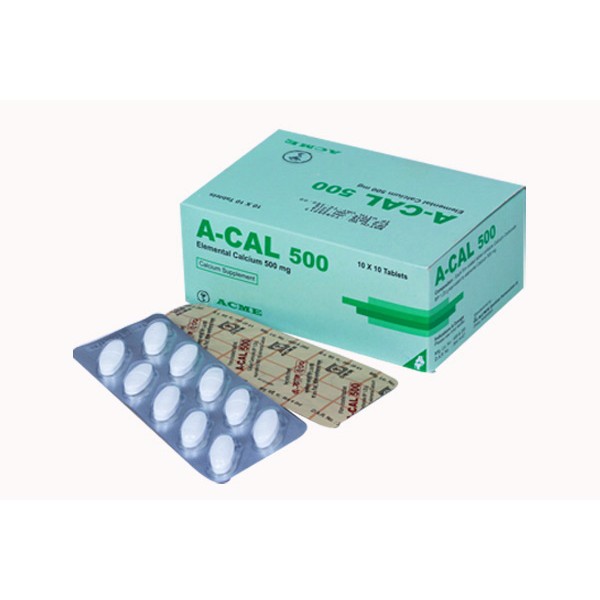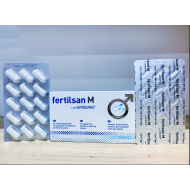
- Stock: In Stock
- Brand: Acme Laboratories Limited
- Product ID: Calcium Carbonate
100% Secure Payment

A-Cal 500 mg Tab
DESCRIPTION
Calcium is an essential body electrolyte. It is involved in the maintenance of normal muscle and nerve function, cardiac function and is essential to blood coagulation.
Calcium Carbonate has three main actions: it supplements dietary calcium, neutralizes gastric acid in peptic ulcer disease and sequesters phosphorous in the intestine to reduce total body phosphate accumulation in chronic renal failure. Calcium requirement varies with age and is relatively greater in childhood, pregnancy and lactation due
to an increased demand, in old age due to impaired absorption, and as phosphate binder in patients with renal failure. Absorption depends on previous intake of calcium, other nutrients, pregnancy, lactation, overall calcium balance and availability of vitamin D.
COMPOSITION
A-CAL 250 chewable : Each chewable tablet contains Calcium Carbonate BP 0.625 g equivalent to 250 mg elemental Calcium. A-CAL 250 : Each film-coated tablet contains Calcium Carbonate BP 0.625 g equivalent to 250 mg elemental Calcium. A-CAL 500 : Each film-coated tablet contains Calcium Carbonate BP 1.25 g equivalent to 500 mg elemental Calcium.
INDICATIONS
In calcium deficiency states : Treatment of calcium deficiency states including osteomalacia, rickets and mal-absorption syndromes affecting the upper gastrointestinal tract.
As therapeutic supplementation : During times when intake may be inadequate, particularly those associated with the increased demand of childhood, old age, pregnancy and lactation. As a phosphate binder : As effective phosphate binder given by mouth to reduce phosphate absorption from the gut in patient with hyperphosphataemia, chronic renal failure in order to prevent the development of renal osteo-dystrophy. Osteoporosis : An adjunct to conventional therapy in the arrest or slowing down of bone demineralisation in osteoporosis or when other effective treatment is contraindicated. As an antacid : Usually in association with other antacids, especially magnesium containing antacids.
DOSAGE AND ADMINISTRATION
A-Cal 250 :
Adults : 2 tablets daily.
Children : 1-2 tablets daily.
A-Cal 500 : 1 tablet daily.
OR AS DIRECTED BY THE PHYSICIAN.
SIDE EFFECTS
Mild gastrointestinal disturbances may occur rarely (e.g. nausea, abdominal pain, constipation, flatulence and eructation etc.)
CONTRAINDICATIONS
Calcium Carbonate is contraindicated in hypercalcemia and hyperparathyroidism, hypercalcemia and nephrolithiasis, Zollinger Ellison Syndrome etc.
PRECAUTIONS
Should be used with caution in patients with impaired renal function, a history of stone formation should also be recommended to increase their fluid intake. High doses of vitamin D should be avoided during calcium therapy unless specially indicated. In case of hypercalciuria the dosage should be reduced or treatment stopped.
USE IN PREGNANCY AND LACTATION
Calcium supplements have been in wide use for many years without apparent ill consequence.
DRUG INTERACTIONS
Calcium Carbonate and other antacids may interfere with the absorption of concomitantly administered tetracycline preparations or ciprofloxacin. This can be minimized by giving Calcium Carbonate and the other medication 2 to 3 hours apart.
SUPPLY
A-CAL 250 chewable : Each box contains 3 X 10 tablets in blister
strips.
A-CAL 250 : Each box contains 10 X 10 tablets in blister strips.
A-CAL 500 : Each box contains 10 X 10 tablets in blister strips.

























%20Pvt.%20Ltd./Movicol-Oral-Powder-190x190.jpg)
